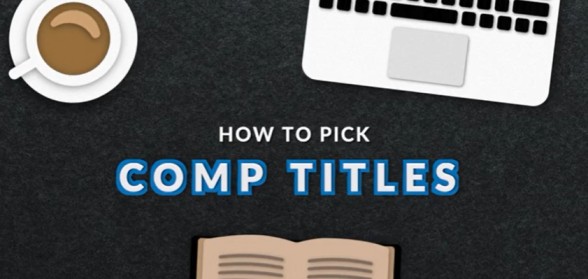
Writer Beware! How to Avoid Publishing Scams
March 25, 2025
The 16 Most Common Fiction Genres
March 30, 2025Comp titles refer to published books that are comparable to your own novel in terms of readership or genre. When submitting your manuscript to a literary agent, it’s a smart idea to mention a few comp titles in your cover letter. These books help agents understand the potential market for your work and can be crucial when they start pitching your manuscript to publishers.
These comp titles serve as a reference, allowing agents to demonstrate how your manuscript fits within the landscape of currently successful books. Whether or not these books are used in the publishing deal process, they help agents navigate the hoops of submitting your manuscript, offering a sense of what might appeal to the target audience.
What’s the Importance of Using Comp Titles?
Comp titles are an effective tool to convey a novel’s genre in a precise and clear manner. For example, typing “romance novels” into Google might bring up titles like Outlander by Diana Gabaldon and It Starts With Us by Colleen Hoover—both are romance novels but appeal to different audiences.
While you can mention your novel as a romance novel, specifying if it’s historical, contemporary, commercial, upmarket, or literary can be helpful. However, the most effective way to define your audience to a literary agent is by providing comparable titles.
As one expert puts it, “Originality is crucial, but ‘there aren’t any other novels like mine’ isn’t going to encourage anyone. Your novel needs to be original within an established market.” Editors use comp titles to demonstrate to the sales team that there is a clear market for your book. With the publishing industry favoring the “safe option”—books by celebrities or debut novels that resemble bestsellers—it’s important to show your originality while still fitting within a recognized market.
How to Find Comp Titles
Finding comp titles can be done through a variety of methods—whether by reaching out locally, using online tools, or checking bestseller lists. One great starting point is to consult with your local bookseller or librarian. They can suggest books within your category or genre, including those that may not be household names but still have significant appeal in the market. Booksellers and librarians are especially helpful if your book crosses multiple genres.
For more targeted searches, online tools like Amazon and Barnes & Noble are excellent. These sites offer valuable sales data and provide features such as “Customers who bought this also bought,” “Frequently bought together,” and “What customers bought after viewing this” that can help uncover similar titles. Goodreads also offers a discovery tool to help you find comparable books based on existing comp titles or by describing your book’s features.
Lastly, bestseller lists from well-known media outlets like The New York Times and USA Today or from retailers can provide a wealth of information. Bestselling books that appear consistently in hardcover and later in paperback are often the strongest candidates, and exploring regional and specialty bestseller lists on websites like the American Booksellers Association can further help pinpoint the most relevant comp titles.
When choosing comp titles, many writers often get stuck thinking the titles should be about the same content as their novel. However, the goal of comp titles is to show the tone, genre, and intended audience, rather than matching the exact storyline.
So, for instance, if your novel is about a teenager searching for her birth parents, you don’t need to pick a title about the same subject—it’s more important to ask yourself, would someone who loved that book also enjoy mine? Comp titles should also reflect a similar style of front cover and the potential bookshop shelf placement.
Think about factors like when the book was published and how well it sold; ideally, you want books that are successful but not necessarily the biggest bestseller. Also, consider whether the book is contemporary or historical fiction, and if it’s literary or commercial. For instance, is your novel likely to be a hit in the e-book format, or would it sit better as a hardback?
A helpful tip is to select books that fall in a similar place on the literary-commercial spectrum. And remember, a good blurb and book cover can often give away whether a novel is more commercial or literary—be mindful of what market your book fits into.
How to Add Comp Titles to Your Cover Letter?
When including comp titles in your cover letter, you want to make sure they fit seamlessly into the flow of your pitch. You can introduce them by saying something like, “My novel would appeal to readers of [Title] by [Author] and [Title] by [Author].”
Alternatively, you could say, “This contemporary romance novel would sit on the bookshelf alongside [Title] and [Title].” To be more specific, you can even blend them with your genre or style: “This is a contemporary romance with a first-person voice similar to [Title] by [Author] and an uplifting love story akin to [Title].” If your novel combines two different genres or offers a fresh take, you might use a ‘Comp 1 meets Comp 2’ approach: “My novel is a dark comedy with supernatural elements, much like [Title] meets [Title].”
You could even reference films or series if they serve as good comparisons to your work. Just remember, the goal is to help the agent picture your book within the market, so choose titles that give a solid view of your novel’s tone, style, and audience.



